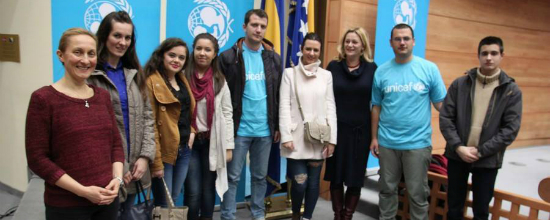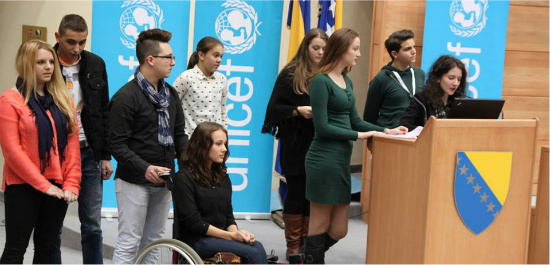Minutes from the Youth Parliament Session – Bosnia and Herzegovina
The Youth Parliament was organized thanks to the UNICEF BIH team. Several courageous women working at UNICEF have been organizing activities for years now only to promote the idea of children’s rights in our country, coping to find different ways for children’s problems to be heard by those who must and who can solve the very same issues. In a similar fashion, the 18th of November was the date when a meeting between the youth and adults took place at the Parliamentary Assembly of Bosnia and Herzegovina, following the 25th anniversary of the Convention on the Rights of the Children. This impressive auditorium witnessed children put forward their positions, present and comment on the results of a UNICEF questionnaire and point to problems they encounter in their daily lives. They required universal healthcare, pleaded for better conditions in the education system, for their right to be heard and to express their opinions. They singled out problems of growing peer violence among children in Bosnian schools, and weak responses to needs faced by children with special needs. They also asked to take part in building a decent society. Not a single marginal group in BIH has ever been as nearly sharp-cut as the children from all over BIH who convened at this meeting. They spoke on behalf of all children in BIH, especially of those in great danger like children in Roma communities, children with development disabilities, and those stuck in institutions and without parental care.
The research confirmed the theoretical insights made by the famous US researcher F.I. Greenstein who developed a theory on the early political awareness and impacts of political socialization on children. Namely, the author concludes that the President and the policeman are the first figures to be recognized as political by children, followed by the recognition of political institutions (the Parliament and the Government) and political processes (Elections) as objects of political identification in later stages of cognitive development. The basic political identity and emotional attachment to central political symbols of a society develops at the age of seven, whereas children begin to understand the behaviour of political leaders only later.
This event corroborated the high levels of political literacy among children, probably revealing higher literacy rates than among certain government representatives given the children’s enviable level of problem articulation. Unlike their parents who sometimes fall silent in front of government representatives, children abandoned the usual diplomatic vocabulary and let the representatives know how much they lack quality food and a safe place to live, how much they are bereft of schooling opportunities despite being enrolled, the fact that their parents are strapped for money to afford books and notebooks, food and snacks, not to mention other accompanying schooling expenses.
They presented very pertinent results by a public opinion poll labeled ” Take us seriously – what children send out to the ones governing ” carried out for UNICEF by Snježana Hasanagić and Maja Dedić. The research’s significance lies in the fact that it divulged the extents to which children, on the one hand, reflect upon politics and politicians in BIH, and perceive the impacts of politics on their lives, on the other hand. The authors’ very representative sample (the poll covered 1033 children in households and 330 children via an online questionnaire) indicates that children do recognize nationalist and religious-driven discrimination, as well as discrimination based on status and looks (especially of those children with development disabilities). The perpetrators of these modes of discrimination are largely children (77 %) educators and teachers (27 %) and politicians (21.7 %). They spoke bluntly about their fears of being bullied in schools, playgrounds and public transport systems, confessing that the incidence of these events is rising. Interestingly, children predominantly and without hesitation to speak up identify politicians (90 %) as being responsible for their hindrances, followed by ministries of education (62 %), parents (45 %) and health departments (39 %).
I was astounded by the candidness and criticism funneled to the decision-makers, government representatives and the MPs by the children. They insisted on healthcare services, free of charge medication for all children, higher number of pediatricians SLPs and SEN teachers. Moreover, they pleaded for a more friendly treatment by medical staff toward children and for weekly school visits by physicians. They demonstrated their political ripeness by understanding that politicians are the ones who can influence the quality of their education, and the ones to act upon children’s need of books and upon peer violence among children which has been identified as a blazing problem by the children. Untroubled by grand narrations about the System, its divisions and dysfunctionalities, the children basically offer practical solutions: adequate punishment of bullies, timely reactions by teachers and educators, greater number of school psychologists, and of course the inclusion of parents in solving the problems. Furthermore, one could discern enormous desire to play, have fun and experience childhood in their opinions, hence they nudged politicians to build playgrounds, parks and recreation centers. Many in the audience were shocked by the children’s strive for a settled community before even knowing anything about the mystical world of politics and its most abstract fragments. Finally, one could hear voices reaching out from this institution asking us to simply live – to lead the ”good life” envisaged by Aristotle , a life which we all aspire to. It was confirmed once again that children, despite not being directly a part of the political system, are capable of giving lectures about the basics of civics to those who skipped the very same lessons in their socialization process. As they circulated at the podium, the usual demagogy-plagued parliamentary assembly regained credibility for a second under the power of the children’s rhetoric. The children sent a strong message to everyone: The Parliament belongs to all of us.
By virtue of ignoring this yesterday’s event, BIH MPs faced a complete fiasco. Apart from a few younger politicians from the Democratic People’s Union, the Social Democratic Party, the Party of Democratic Action and from Our Party, it has to be known and retained that none of the high-ranking politicians took part at the occasion. Maybe it is better that way. This makes the lesson by the children to the invisible MPs which lost every touch with reality even more vivid. Thus, figures from the research showing 82.4 % of children pulling back from future carriers in politics due to a negative perception of politics is hardly surprising. The uncorrupted moral and the clear reasoning which can be found only in the heads of children inspire with hope and trust. Schools and universities will, of course, do nothing to utilize the democratic potential of the youth, inasmuch as they fall under a system which will periodically persuade them of the meaningless of their own thoughts or the ones inherited in their families. I recalled John Lennon once saying: When I was 5 years old, my mother always told me that happiness was the key to life. When I went to school, they asked me what I wanted to be when I grew up. I wrote down ‘happy’. They told me I didn’t understand the assignment, and I told them they didn’t understand life.
Our MPs have not only missed to show interest in understanding our children’s lives, but they also did not understand the assignment!
.
translated by Mario Munta
.















Leave a Comment
Your email address will not be published. Required fields are marked with *